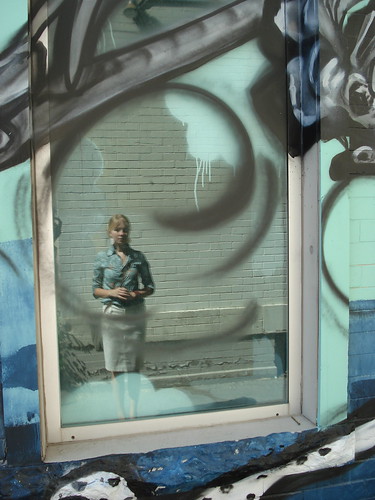
This is a woman whose name I can never quite remember. She is one of the women we talked to who was kidnapped. From the very first day that I met her, I was just struck first by how beautiful she is, and what a great presence she has. She has this beautiful smile and this way of communicating that while I feel shy not speaking any Russian, being around her makes me comfortable and wanting to speak. She has these two beautiful little girls, one of who has adopted me as her favorite teacher (which I don’t mind in the least). This woman studied at the University and her husband was a lawyer in Chechnya until they had to leave because of the war.

Luisa is one of the girls in the class. She is 25 years old, and she is from Grozny. How many times did I hear that in class along with “hello. How are you? I am very well, thank you. How are you? What is your name? Where are you from?” When the wedding was held for the 12 year old, we wondered how Luisa felt, being 25 and single in the culture that seemed to promote marriage from a very young age. As we talked with her, however, we realized that she felt no pressure to be married. While it would be nice, she was a big city girl, and had big plans to travel to places where she would need to ask for directions in English and find an Internet café.

This is Liza. She is 23 years old, and in love with a married man in Ingushetia. Her family, while living in Ingushetia, was also touched by the war and had to leave, and had actually only been at the center for a week before we arrived. She is absolutely beautiful, and is so quick to laugh about her mistakes, and mischievously say “Sorry, I don’t have a watch” to get out of answering a question about the time. We went swimming together in the dirty, dirty river twice. I wore a bathing suit, and she wore a dress. She didn’t mind me being so scantily clad, and wished she had one as well. We splashed about in the river, avoiding the currant and laughing at out breathe holding contest. She told me about studying Chemistry and wanting to work in pharmacology. I told her about domestic violence and being worried about starting school again. We talked about love and heartaches, and I realized that we weren’t so different at all. Even in war, all of those same things continue.

Albina is a quite, serious girl. She looks sad a lot of the time, and I think that it is because she is 12 and has a boyfriend who lives in Chechnya. Ah, the drama of it all. She loves to pose, and always wanted to be a model. She it really beautiful, and I wondered as I watched her dance, which of these young 19-25 year old men had their eye on this beautiful 12-year-old for a wife? We watched a Hindi film with her and her sisters, all of who are totally beautiful, and we tried to copy the movements of the film stars. We giggled a lot.
Marha, Madina, Jaha, Hava. Four sisters, ages nine to 15, who would sometimes mix up the Norwegian numbers with English. But other than that, they are such bright girls! They all came to classes, and would cling to us and talk in English. And they were my favorite models, each one hamming it up for the camera at every opportunity. Such sassy little misses, who reminded me of Little Women, living with their beautiful mother with a missing father. Tea with them was always a fun time, especially because then we would end up Chechen dancing.
Unka is a 9 year old and a perfect hostess. She is from Dagestan, and we aren’t exactly sure what their story is and not sure that they will get refugee status to stay in Poland. She is such a smart girl though, and one of those kids that there is no stopping. She will do anything, and can do anything. Sometimes she would take advantage of that, but we couldn’t stay mad at her for long, since she was just so good at things, and loved us to pieces.




























